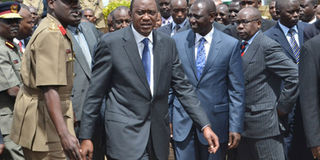Respect Kenya, Githu Muigai tells ICC

President Uhuru Kenyatta (second left) Deputy William Ruto (third left) and Attorney general Githu Muigai (second right). The Kenyan delegation to an African Union meeting will launch a battle to have charges against Deputy President William Ruto transferred from the ICC. PHOTO | JEFF ANGOTE
What you need to know:
- Mr Muigai said that the ICC prosecutor Ms Fatou Bensouda should show Kenya, mutual respect, professional recognition and realise that it is not a failed state.
- Executive director of International Center for Transitional Justice (ICTJ) in Kenya Mr Njonjo Mue however harshly refuted Mr Muigai’s sentiments on setting up a local ICD.
- German director of International Law at the Federal Foreign Office Dr Pascal Hector urged Kenyan leaders to work together with other African countries to make the judicial system better so as to promote complementarity.
Kenya’s Attorney General Githu Muigai has urged the International Criminal Court (ICC) to stop showing contempt for Kenya’s judicial order even as it sets up local tribunal.
Mr Muigai said that the ICC prosecutor Ms Fatou Bensouda should show Kenya, mutual respect, professional recognition and realise that it is not a failed state.
“Kenya is a functioning democracy that has independent institutions,” said Mr Muigai, “We have a credible and secure witness protection programme and I am its professional head.”
He was speaking during a complementarity debate hosted by Germany and Kenya on Saturday at The Hague.
Mr Muigai revealed that it came as a surprise that the ICC declared that it had overwhelming evidence when confirming charges against six Kenyan suspects accused of crimes against humanity related to 2007-2008 post poll violence.
“This was not the case as the narrative on evidence against all accused has kept changing,” he said, “ Ms Bensouda keeps saying that the Kenyan government has not cooperated with them to provide evidence against the accused.”
He added that the complaints portray Kenya as a failed state even amidst efforts to set up an International Criminal Division (ICD) to handle future crime cases. The ICC further kept saying that Kenya has failed to protect its witnesses, Githu said.
“I requested Ms Bensouda to avail these witnesses to me so that I can sufficiently protect them with the little resources we have,” he added, “So ICC claims I am guilty of not protecting witnesses whose identities I do not know.”
Dr Samuel Kobia, commissioner of the Judicial Service Commission seconded Mr Muigai. He said that ICC has to give Kenya due respect.
“It should support Kenya in building the national rule of law by creating ICD, because this is what will determine its success in Kenya,” Dr Kobia argued.
He added that Kenya is fully prepared to launch the ICD by January 2014. “We have visited Uganda, Rwanda, Cambodia, Hague and we will go to Bosnia in January to study previous experiences from their local divisions that we can apply in Kenya.”
“Setting up an ICD will not interfere with the current Kenyan cases at the ICC and Mr Muigai has stated that this should be well understood,” said Dr Kobia.
NOT READY
Attorney general for the Republic of Botswana Ms Athalia Molokomme however felt that Kenya was not ready enough to set up a local international criminal division.
“Generally in Africa, I have the notion that our legal and institutional structures are not well developed to meet the set standards by the international court, Kenya is not an exception,” she said.
To make her argument valid, she gave an example of the African Union (AU) court that was to set up criminal measures, but has taken eternity to commence operations.
“We have few structures that do not back up our operations and all state parties need to engage in constructive talks that can reward our ventures in setting up local international crime divisions,” Ms Molokomme said.
WHITE ELEPHANT
Executive director of International Center for Transitional Justice (ICTJ) in Kenya Mr Njonjo Mue however harshly refuted Mr Muigai’s sentiments on setting up a local ICD.
“How prepared are we to set up a local ICD when our witness protection unit is not vibrant and its budget is insufficient and has currently been reduced by 15 per cent?” he asked Mr Muigai.
“What magic will we need as Kenyan leaders to generate the will to be fair in the ICD, when we have initially failed several times?” he questioned.
Mr Mue said that the ICD is being set up with the leaders’ minds geared towards the possibility of bringing the three Kenyan cases at the ICC back home.
He said that the civil society is not opposing the move to set up the division but urged Kenyans and leaders involved to be careful not to set up a ‘white elephant’.
“By this, I mean a division that will be hostile to pursuing justice to victims of post-election violence,” Mr Mue said.
German director of International Law at the Federal Foreign Office Dr Pascal Hector urged Kenyan leaders to work together with other African countries to make the judicial system better so as to promote complementarity.
“Generally, I have spotted numerous deficits in enforcing the law in the region, setting up a local division alone is not enough, it needs to be supported by putting into practice the set laws,” Dr Hector said.
Prof Alex Whiting, Harvard Law School, said that Kenya needs to have a great political will, commitment and togetherness so as to set up a local tribunal.
“There are great political divisions in Kenya, this should be worked on to help stop the divide among leaders and work towards a vibrant local tribunal.”





